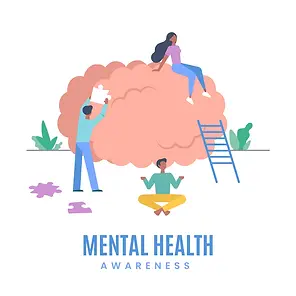

About this website
This website aims to make people aware of the importance of different mental health disorders, what are their symptoms, the medical management options, and the non-medical management options available. The greek word stigma means “ to carve, to mark as a sign of shame, punishment or disgrace”. It is largely associated with physical deformity or disfigurement or an undesirable or dangerous characteristic that can provoke and perpetuate stigma. Discrimination on the other hand results in definitive actions like prejudice, isolation/rejection, and stereotyping. Stigma and discrimination have existed throughout history concerning both physical and mental health. According to the UN, nearly 1 billion people suffer from some mental health disorder, including 1 in 7 teenagers. These numbers are scary, reflecting the need for an organized and proper management plan, both by the government and private healthcare facilities worldwide.


Unfortunately, out of these numbers, a large portion of people are unaware of their debilitating mental health and the availability of care leading to the imbalance between the healthcare workers and the target population. Moreover, the stigma in society about the mental health care system makes it even more difficult to provide medical services. Many believe that visiting a psychiatrist would label them mentally unfit, and society would address them as “crazy” or “mad”. Our job as humans is to erase this stigma and help the people around us. The COVID-19 pandemic has made the situation even worse. Many people faced financial troubles, many lost their loved ones, constraints in availing of essential services, and many more issues. This led to a dramatic rise in the newly diagnosed cases of depression and anxiety in the population. Also, many with a history of mental health disorders saw a flare-up in their psychiatric illnesses.
I want to emphasize the importance of awareness by giving an example of a patient encounter that I had during my patient practice. While working in a resource-limited facility in a local government hospital in Mumbai, a 54-year-old female was referred to me by the internal medicine department for complaints of decreased sleep, generalized weakness, weight loss, decreased motivation, and fearfulness. On speaking with her she asked me what kind of department is this. I politely said to her that this is the psychiatry department where we treat sadness, fearfulness, stress, and many other illnesses. She looked at me with hopeful eyes and asked me in a low tone if her symptoms are curable. I assured her that I would do the best that I can and after a brief history, I diagnosed her with Mixed Anxiety Depressive Disorder. A few months after the treatment she came to me for her follow-up visit and thanked me for her full recovery. She mentioned that she will try to promote psychiatry and the availability of treatment in her neighborhood.
